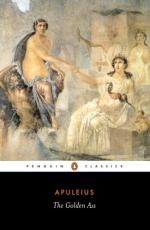Which done, in great feare I rode through many Outwayes and desart places, and as culpable of the death of Socrates, I forsooke my countrey, my wife, and my children, and came to Etolia where I married another Wife.
This tale told Aristomenus, and his fellow which before obstinatly would give no credit unto him, began to say, Verily there was never so foolish a tale, nor a more absurd lie told than this. And then he spake unto me saying, Ho sir, what you are I know not, but your habit and countenance declareth that you should be some honest Gentleman, (speaking to Apuleius) doe you beleeve this tale? Yea verily (quoth I), why not? For whatsoever the fates have appointed to men, that I beleeve shall happen. For may things chance unto me and unto you, and to divers others, which beeing declared unto the ignorant be accounted as lies. But verily I give credit unto his tale, and render entire thankes unto him, in that by the pleasant relation thereof we have quickly passed and shortned our journey, and I thinke that my horse was also delighted with the same, and hath brought me to the gate of this city without any paine at all. Thus ended both our talk and our journey, for they two turned on the left hand to the next villages, and I rode into the city.
THE SIXTH CHAPTER
How Apuleius came unto a city named Hipate, and was lodged in one Milos house, and brought him letters from one Demeas of Corinth.
After that those two Companions were departed I entred into the City: where I espied an old woman, of whom I enquired whether that city was called Hipata, or no: Who answered, Yes. Then I demaunded, Whether she knew one Milo an Alderman of the city: Whereat she laughed and said: Verily it is not without cause that Milo is called an Elderman, and accounted as chiefe of those which dwel without the walls of the City. To whom I sayd againe, I pray thee good mother do not mocke, but tell me what manner of man he is, and where he dwelleth. Mary (quoth shee) do you see these Bay windowes, which on one side abut to the gates of the city, and on the other side to the next lane? There Milo dwelleth, very rich both in mony and substance, but by reason of his great avarice and insatiable covetousnes, he is evill spoken of, and he is a man that liveth all by usurie, and lending his money upon pledges. Moreover he




